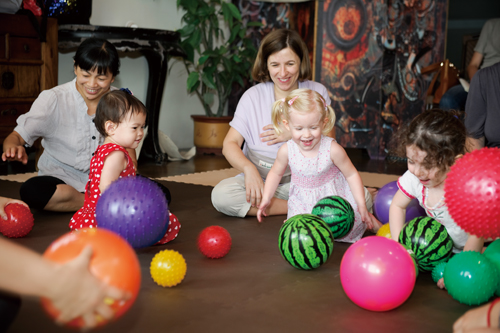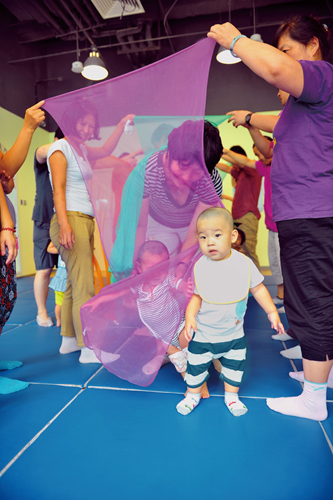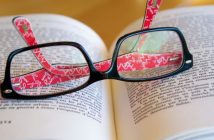 Parents may like to harbor daydreams of their little one being the next musical prodigy: a Beethoven, a Yo-Yo Ma, or even a Jimmy Page. While starting children in early music education classes may nurture that prodigal potential, most early music programs are designed to help develop your child in far more basic, but nonetheless, vital ways.
Parents may like to harbor daydreams of their little one being the next musical prodigy: a Beethoven, a Yo-Yo Ma, or even a Jimmy Page. While starting children in early music education classes may nurture that prodigal potential, most early music programs are designed to help develop your child in far more basic, but nonetheless, vital ways.
There is no evidence to support claims that early music education increases intelligence, but introducing a young child to music helps prime the brain for further development and build basic skills that will help children in later learning environments. Exposure to and interaction with music, especially through constructive classes, helps children begin to find and keep a steady beat and distinguish rhythms and tones, skills tied to developmental milestones. After learning how to keep a steady beat, “[children]can learn to crawl, walk, run, ride a bicycle, later on use scissors. It’s not just a musicianship skill,” says Sarah Peel, director of music programs at Lafafa Education International.
Scientific research also indicates that the brains of people with musical instruction showed greater ability to adapt to new knowledge and learning, a relationship that was even stronger in people with early musical training. While aiming to help your child develop optimal brain adaptability is a noble goal, focusing on the more basic and necessary skills a child acquires in music class will yield greater rewards. Common
early music class instruments include wood blocks, egg shakers, and tambourines, which help children develop their motor skills and hand-eye coordination.
“There’s research that music is similar [to]language,” says Chloe Zhao, a teacher at MiCho Education. Both music and language “have grammar; they both have structure.” Research has indeed shown a positive correlation between music education and reading ability. Learning to distinguish tones and rhythms encourages development in listening skills and processing sound, which also develop reading skills. “We are really looking to build skills in class that help [your child]in the classroom later, that are going to help [your child]in life, in general,” adds Peel.
Children also learn what it’s like to be in a learning environment for the first time. According to Kristin Koh, founder and instructor at My Little Mozart, “The first time a child comes they tend to find [the class]very long. By the third or fourth class, they know when to take a toy or the instrument and when to put it back again.”
Many parents are eager to put their child in formal instrument classes, but Peel states: “Before Grade 1, [children]are not physically or mentally ready [to become performance musicians].” More formal music training has plenty of brain-related benefits, especially with regard to spatial functions, but allowing your child to explore music in general can pave the way for learning an instrument later.
Another way to help a young child get the most out of music education
classes is for the parent to have a positive, enthusiastic attitude. “How the mother [or attending parent]feels affects the child,” notes Koh. “If the mother comes in with a very eager and positive attitude towards the class, [then]three quarters of the battle [for the children to participate]is won.”
A few years ago, early music classes were difficult, if not impossible to find in Beijing, but now there are 80 licensed Kindermusik instructors
in the city, not to mention other practitioners of different music programs. It’s never too early or too late to start your child in music education classes. When you think your child is ready, be it at two months or two years of age, music classes are readily available.
Finding the school that’s right for you and your child is important, so make sure you both feel comfortable with the teachers and the school. Look for teachers that stay low to maintain eye contact with the students, and see if the school properly sanitizes toys,
instruments, and classrooms. Lafafa Education International, Micho Education and My Little Mozart are some popular options for children’s music classes in Beijing.
 Lafafa Education International
Lafafa Education International
Part of Mama Look International Family Center in Chaoyang Joy City, Lafafa offers Kindermusik classes for children up to 6 years old. Peel, the director, is originally from Canada and has been in Beijing since 2006, when she first began teaching Kindermusik classes. She joined Lafafa in 2009 and has helped expand the school and train new staff members.
Lafafa uses the Kindermusik curriculum, which is based on using music to enhance every stage of development and uses a set of recorded sounds and music. Classes use fun learning toys like parachutes and scarves to let students use their energy and interact with the music.
“This is not a performance class, this is not a learn-to-be-a-musician class; it’s a class about using music and music-based activities to help a child [reach]their best potential,” declares Peel. “Everything has a basis in high-quality music. Actual music theory and instruction is included, but it is part of a much bigger approach to get kids to be their best selves.”
 Classes are taught in English with translation by a Chinese
Classes are taught in English with translation by a Chinese
co-teacher. Tuition price, which is based on pre-paid membership, starts at RMB 6,600 for 24 classes, covers the cost of all materials. Home materials include music, instruments, and a parent education piece. Parent participation is important. As Peel explains, “My goal is that class isn’t 45 minutes a week. A child’s first and best teacher is their parent or whoever looks after them at home. [I’m here to] help you and I work together as a team for your child.”
MiCho Education
Classes at MiCho Education follow the Music Together curriculum. They are a combination of recorded music, live guitar, and interactiveinstrument time. Zhao says, “We keep it fun so children will like music, and enjoy the interactive connection with their parents and other children, too.”
The Music Together approach aims to nurture a child’s natural affinity for music and stresses parental involvement and participation during class and at home. Classes are filled with movement and encourage children to experience music to learn a basic music competence. MiCho has three teachers, with classes six days a week at the China Cultural Center near Liangma Qiao and at Euro Plaza in Shunyi. The school operatesunder the idea that all children are musical, and growth is tracked through three stages: discovery, development, and maturation.
Classes have fewer than ten students, and instructors encourage attending parents to sing along and to dance or play instruments right along with their child. Classes are RMB 120 per class, with discounts for siblings. Instruction is in English with a few directions also given in Chinese.
 My Little Mozart
My Little Mozart
My Little Mozart Founder Kristin Koh carries a Bachelor’s degree in piano performance and a Master’s degree in piano pedagogy. At My Little Mozart, the Kindermusik curriculum is supplemented with Koh’s own collection of music from around the world. Like other music programs, My Little Mozart offers a variety of classes based on a child’s age. Koh also emphasizes parent involvement, especially at-home reinforcement and consistency between home and classroom. “We believe in educationthrough interest and stimulation,” says Koh. Instructors work to ensure that children are having fun and learning at the same time.
My Little Mozart also offers keyboard classes that are fun and age appropriate for children over 5 years old. All classes, including parent-baby classes and keyboard classes, are RMB 120 per class.
“I don’t make them sit for 45 minutes all the way through,” Koh explains. It’s not about becoming the next Beethoven, but more importantly, as Koh puts it: “I need them to understand how music works.”
Resources
Lafafa Education International 拉法法儿童教育
Mama Look Family Center, 10/F-DD02, Chaoyang Joy City, 101 Chaoyang Bei Lu (at the intersection of Qingnian Lu), Chaoyang District. 北京市朝阳区朝阳北路101号朝阳大悦城10F-DD02玛玛洛可国际家庭中心
MiCho Education
(8113 8282, michoedu@yahoo.com)
www.michoeducation.com
My Little Mozart
Rm 108, Block 5, Lishui Jiayuan, Chaoyang Gongyuang Nanlu Liu Li Tun, Chaoyang District (135 2256 3767, kristinkoh@yahoo.com) www.mylittlemozart.com 朝阳区朝阳公园南路六里屯丽水嘉园5单元108室
Kindermusik
www.kindermusik.com
Music Together
www.musictogether.com
The Impact of Music on Language & Early Literacy
www.abcmusicandme.com/documents/Impact_of_Music_on_Literacy.pdf
Watanabe et al. The Effect of Early Musical Training on Adult Motor Performance
http://psych.concordia.ca/fac/penhune/publications/watanabe_EBR_07.pdf
This article is excerpted from beijingkids August 2012 issue. View it in PDF form here or contact distribution@beijing-kids.com to find out where you can pick up your free copy.



